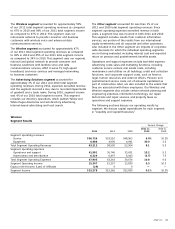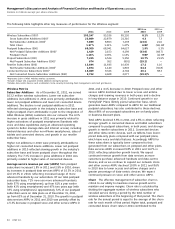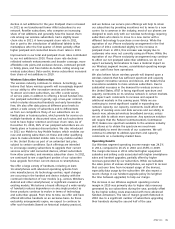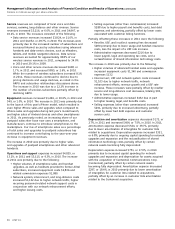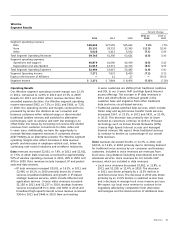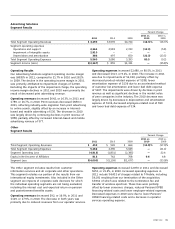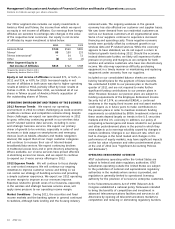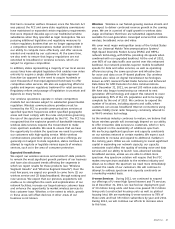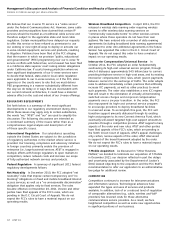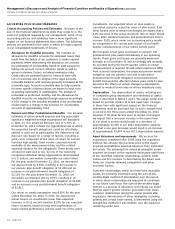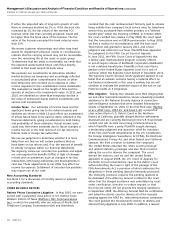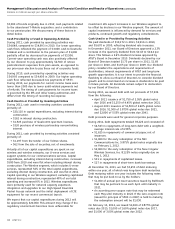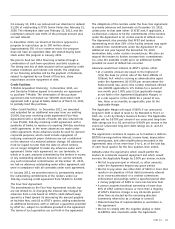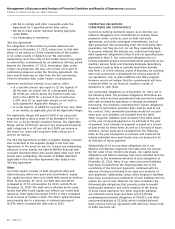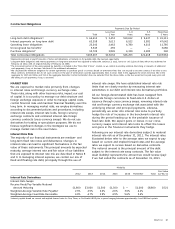AT&T Wireless 2011 Annual Report Download - page 44
Download and view the complete annual report
Please find page 44 of the 2011 AT&T Wireless annual report below. You can navigate through the pages in the report by either clicking on the pages listed below, or by using the keyword search tool below to find specific information within the annual report.
Management’s Discussion and Analysis of Financial Condition and Results of Operations (continued)
Dollars in millions except per share amounts
42 AT&T Inc.
Wireless Broadband Competition In April 2011, the FCC
released a wireless data roaming order requiring wireless
carriers to offer wireless data roaming services on
“commercially reasonable terms” to other wireless carriers
in places where those operators do not have their own
systems. We have entered into a number of data roaming
agreements (including broadband data roaming agreements)
and expect to enter into additional agreements in the future.
Verizon has appealed this order in the D.C. Circuit Court of
Appeals. We do not expect this order to have a material
impact on our operating results.
Intercarrier Compensation/Universal Service In
October 2011, the FCC adopted an order fundamentally
overhauling its high-cost universal service program, through
which it disburses approximately $4.5 billion/year to carriers
providing telephone service in high-cost areas, and its existing
intercarrier compensation (ICC) rules, which govern payments
between carriers for the exchange of traffic. The order adopts
rules to address immediately certain practices that artificially
increase ICC payments, as well as other practices to avoid
such payments. The order also establishes a new ICC regime
that will result in the elimination of virtually all terminating
switched access charges and reciprocal compensation
payments over a six-year transition. In the order, the FCC
also repurposed its high-cost universal service program
to encourage providers to deploy broadband facilities
in unserved areas. To accomplish this goal, the FCC will
transition support amounts disbursed through its existing
high-cost program to its new Connect America Fund, which
eventually will award targeted high-cost support amounts to
providers through a competitive process. AT&T supports many
aspects of the order and new rules. AT&T and other parties
have filed appeals of the FCC’s rules, which are pending in
the Tenth Circuit Court of Appeals. AT&T’s appeal challenges
only certain, narrow aspects of the order; AT&T intervened
in support of the broad framework adopted by the order.
We do not expect the FCC’s rules to have a material impact
on our operating results.
T-Mobile Acquisition As discussed in “Other Business
Matters,” we decided to terminate our acquisition of T-Mobile
in December 2011; our decision reflected in part the delays
and uncertainty associated by the Department of Justice’s
(DOJ) lawsuit objecting to the acquisition and the FCC Staff’s
recommendation to refer our application to an administrative
law judge for additional review.
COMPETITION
Competition continues to increase for telecommunications
and information services. Technological advances have
expanded the types and uses of services and products
available. In addition, lack of or a reduced level of regulation
of comparable alternatives (e.g., cable, wireless and VoIP
providers) has lowered costs for these alternative
communications service providers. As a result, we face
heightened competition as well as some new opportunities
in significant portions of our business.
We believe that our U-verse TV service is a “video service”
under the Federal Communications Act. However, some cable
providers and municipalities have claimed that certain IP
services should be treated as a traditional cable service and
therefore subject to the applicable state and local cable
regulation. Certain municipalities have delayed our requests
to offer this service or have refused us permission to use
our existing or new right-of-ways to deploy or activate our
U-verse-related equipment, services and products, resulting
in litigation. Petitions have been filed at the FCC alleging
that the manner in which we provision “public, educational
and governmental” (PEG) programming over our U-verse TV
service conflicts with federal law, and a lawsuit has been filed
in a California state superior court raising similar allegations
under California law. If courts having jurisdiction where we
have significant deployments of our U-verse services were
to decide that federal, state and/or local cable regulation
were applicable to our U-verse services, or if the FCC, state
agencies or the courts were to rule that we must deliver
PEG programming in a manner substantially different from
the way we do today or in ways that are inconsistent with
our current network architecture, it could have a material
adverse effect on the cost and extent of our U-verse offerings.
REGULATORY DEVELOPMENTS
Set forth below is a summary of the most significant
developments in our regulatory environment during 2011.
While these issues may apply only to certain subsidiaries,
the words “we,” “AT&T” and “our” are used to simplify the
discussion. The following discussions are intended as
a condensed summary of the issues rather than as a
comprehensive legal analysis and description of all
of these specific issues.
International Regulation Our subsidiaries operating
outside the United States are subject to the jurisdiction
of regulatory authorities in the market where service is
provided. Our licensing, compliance and advocacy initiatives
in foreign countries primarily enable the provision of
enterprise (i.e., large-business) services. AT&T is engaged in
multiple efforts with foreign regulators to open markets to
competition, reduce network costs and increase our scope
of fully authorized network services and products.
Federal Regulation A summary of significant 2011 federal
regulatory developments follows.
Net Neutrality In December 2010, the FCC adopted “net
neutrality” rules that impose certain transparency and “no
blocking” obligations on fixed and mobile broadband Internet
access services, as well as a “no unreasonable discrimination”
obligation that applies only to fixed services. The rules
became effective on November 20, 2011. Verizon and other
parties have filed appeals of the FCC’s rules, which are
pending in the D.C. Circuit Court of Appeals. We do not
expect the FCC’s rules to have a material impact on our
operating results.



